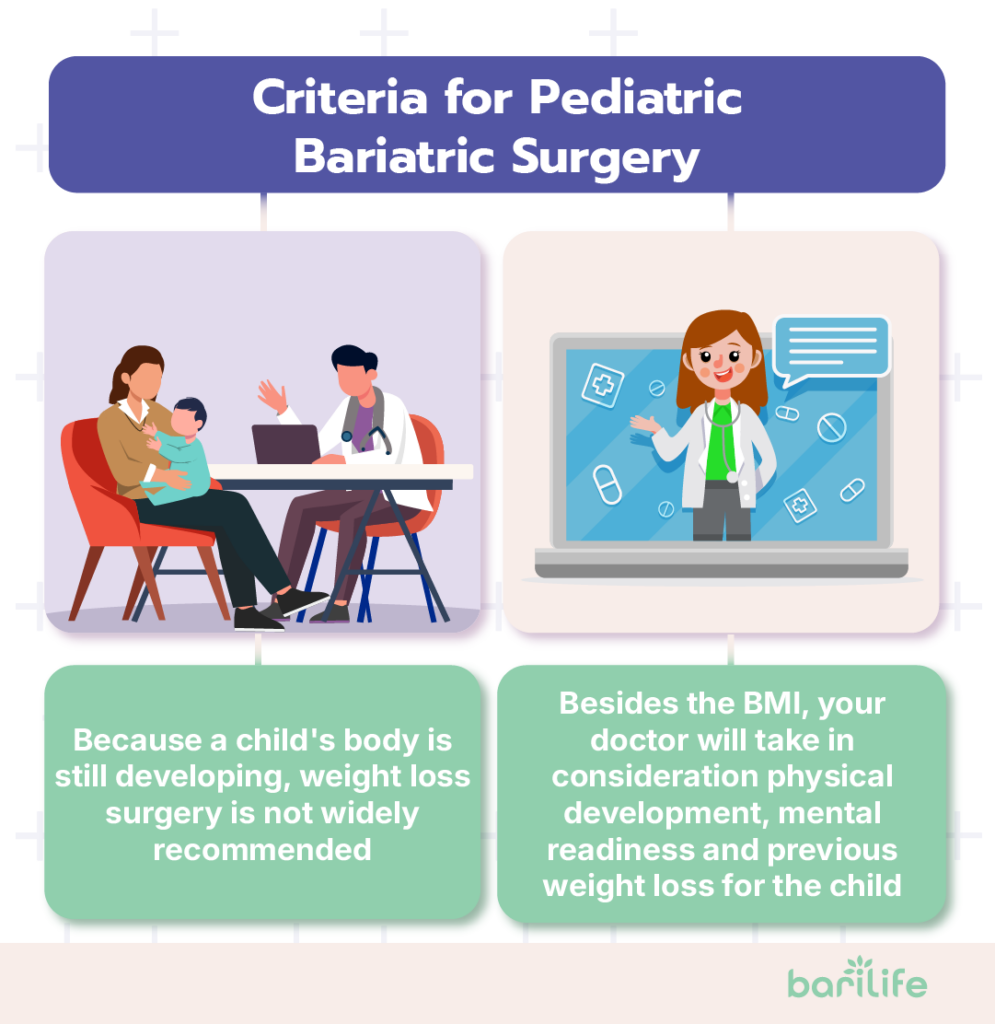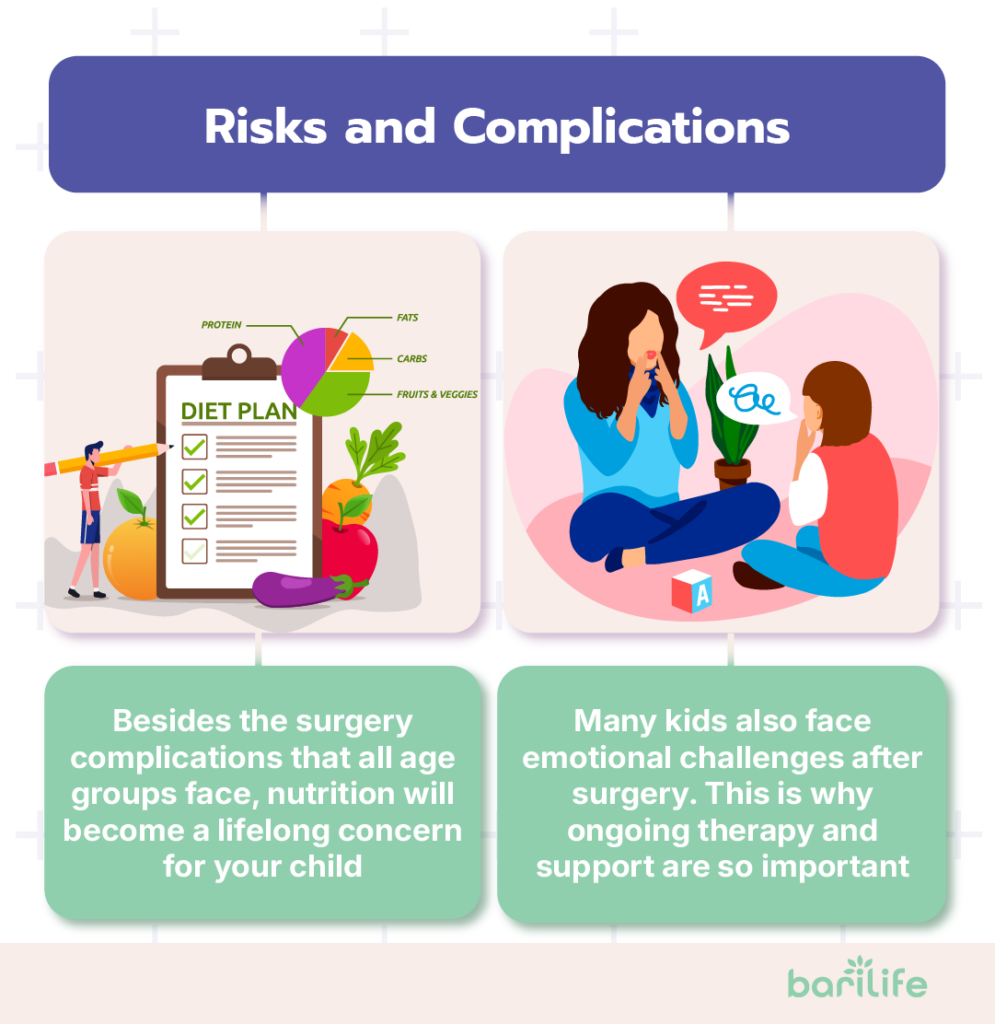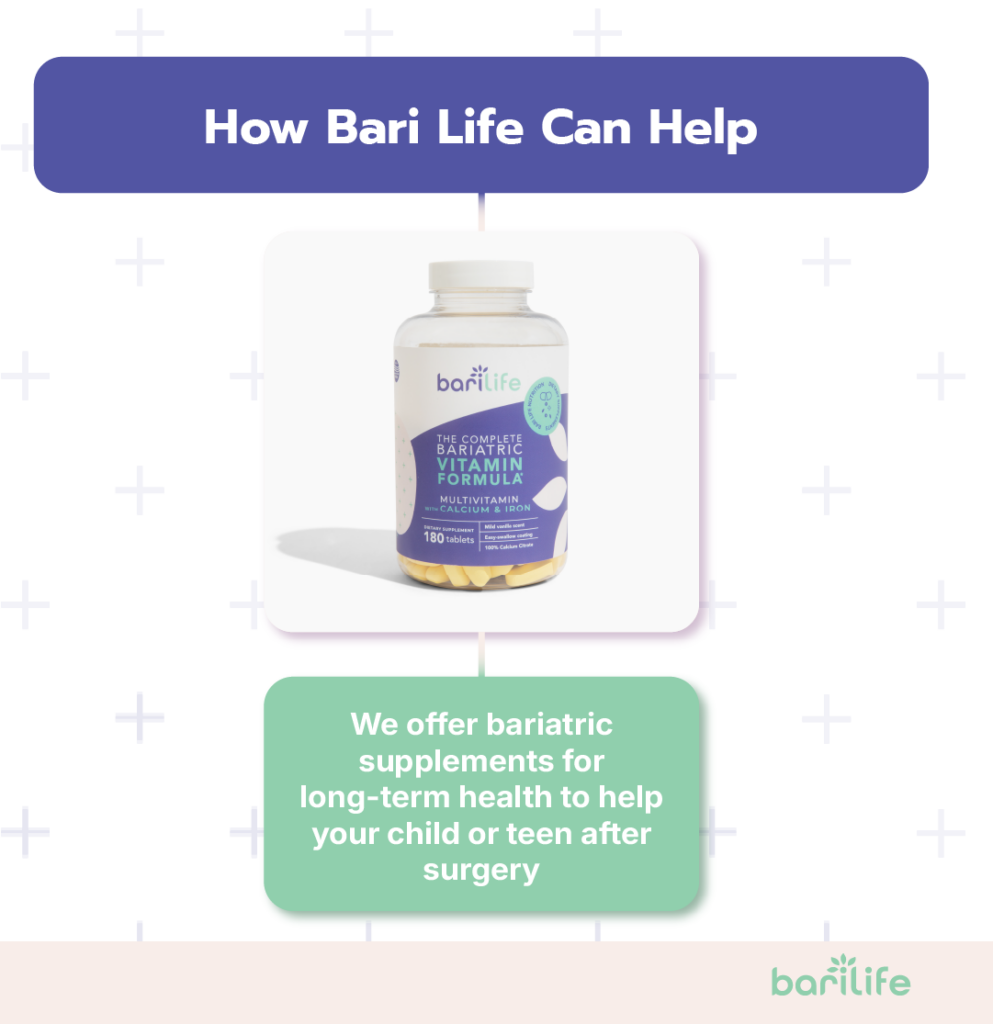Key Takeaways
- Pediatric bariatric surgery is a significant decision that may benefit children with severe obesity who meet strict medical and psychological criteria.
- Sleeve gastrectomy and gastric bypass are the most common procedures for pediatric patients.
- While surgery can lead to significant weight loss and health improvements, it also comes with potential risks, including surgical complications, nutritional deficiencies, and emotional challenges.
If your child struggles with severe obesity, you may have tried countless diets, exercise programs, and doctor visits without lasting success. As a parent watching your child face health problems and social challenges, you may be wondering if surgery could help. Pediatric bariatric surgery has become an option for some children, but it’s a decision that comes with much consideration.
In this article, we walk you through what you need to know to make the best choice for your family—including whether there is a best age for bariatric surgery.
Table of Contents
Criteria for Pediatric Bariatric Surgery

Doctors don’t recommend weight loss surgery for every overweight child. The guidelines are strict as bariatric surgery can impact a body that’s still growing and maturing.
Your child might be considered for surgery if they have a BMI of at least 40 or a BMI over 35 with health complications like diabetes or severe sleep apnea. Most programs focus on teens who are 14 years and older, though some may consider younger children in extreme cases. In fact, discussions about bariatric surgery at 16 are becoming more common as outcomes in this age group show promise.
Physical development plays a key role as well. Girls should generally be at least two years past their first period, and boys should be near their adult height. This timing helps ensure surgery won’t interfere with normal growth patterns.
Mental readiness also matters. Your child needs to understand what surgery involves and commit to lifelong habits. They should have realistic expectations about both the results and the challenges ahead.
Many programs require at least six months of medically supervised weight management attempts before considering surgery.
Family support is also essential. You’ll need to help with dietary changes, medical appointments, and adjusting to new eating patterns. The reality is simple: success is unlikely without involved parents.
Types of Bariatric Procedures for Children
Doctors typically consider a few surgical options for young patients, carefully weighing which approach makes the most sense for growing bodies.
Sleeve Gastrectomy
Sleeve gastrectomy has become the most common choice for children. This surgery removes about 75-80% of the stomach, creating a smaller, banana-shaped pouch. With less stomach capacity, your child feels full faster, while hormonal changes reduce hunger. Most pediatric programs prefer this option because it works well without rerouting the intestines.
Gastric Bypass
Gastric bypass is another possibility. This procedure creates a small stomach pouch linked directly to the middle part of the small intestine. While it helps with weight loss, it can cause nutritional deficiency problems—a real concern when you’re dealing with a growing kid.

Benefits of Pediatric Bariatric Surgery
For the right candidates, surgery can truly change lives.
According to the Teen-Longitudinal Assessment of Bariatric Surgery (Teen-LABS) study, adolescents who underwent bariatric surgery experienced significant weight loss and health improvements.
Three years post-surgery, participants had an average weight reduction of 27%, equating to approximately 90 pounds.
At the five-year mark, these adolescents maintained a 26% reduction in body weight. Furthermore, a decade after surgery, a multi-site study reported a mean body mass index (BMI) reduction of 20%, along with significant improvements in obesity-related conditions such as type 2 diabetes, high blood pressure, and high cholesterol.
The emotional changes can be just as powerful. Many children feel better about themselves, experience less depression, and face less bullying after surgery. They often join activities they previously avoided because of their weight.
Early intervention may also prevent years of health problems by addressing obesity before permanent damage happens. Research suggests that treating severe obesity during childhood works better than waiting until adulthood.
Risks and Complications
While the benefits can be impressive, surgery comes with real risks that every parent should understand.
Like any major operation, complications can happen. These include problems from anesthesia, bleeding, infection, blood clots, and leaks where surgical connections are made. These issues aren’t common, but they can be serious when they occur.
After surgery, nutrition becomes a lifelong concern. Your child will probably forever need daily vitamins and supplements. Without these, they could develop shortages of iron, calcium, vitamin D, and other nutrients that could hurt their growth and development.
Many kids also face emotional challenges after surgery. Some struggle with their changing body image. Others develop different eating issues or swap food-focused behaviors for other concerns. This is why ongoing therapy and support are so important.

Weight loss isn’t always permanent. Some weight may come back over time, especially if healthy habits slip. For kids with their whole lives ahead of them, keeping weight off for decades presents a real challenge.
We also don’t know everything about the long-term effects yet. Since weight loss surgery for kids is relatively new, we don’t have much information about how patients are doing 20 or 30 years later.
Pre-Surgery Preparation & Evaluation
If you’re considering this path, the evaluation process is thorough and takes several months, for good reason.
Your child will meet with multiple healthcare specialists, such as a:
- Primary healthcare provider
- Bariatric Surgeon
- Dietitian
- Psychologist
Each specialist helps determine if surgery is indeed the right option.
The primary healthcare provider and bariatric surgeon help determine whether bariatric surgery is a safe and plausible option for your child.
The psychological evaluation looks at whether your child understands what surgery means for their future and if they have any mental health issues that need addressing first.
Nutritional counseling prepares them for major dietary changes. They’ll learn about healthy eating, portion control, and vitamin needs.
As parents, you’ll need education, too. You’ll learn to support your child through recovery and beyond, including understanding new eating patterns and recognizing potential problems.
Getting insurance approval often takes work, but it is increasingly possible. The process can take several months and might require appeals if initially denied.
Post-Surgery Care & Lifestyle Changes
Recovery starts in the hospital, which is generally a 1 to 3-day stay. The first few weeks at home involve gradually increasing activity while following a carefully planned diet progression.
The eating changes are dramatic and permanent. Your child will start with liquids and move to pureed foods, then soft foods, and finally regular foods in tiny portions. They’ll need to eat slowly, chew thoroughly, and stop when full. Protein becomes a priority, while sugary and fatty foods take a backseat.

Daily vitamins become a must. Regular blood tests will check nutrition levels to catch any problems early. Doctor visits will be frequent at first—typically every few months in the first year, then yearly after that. These appointments track weight loss and nutrition status and address any concerns.
Exercise is essential for maintaining a healthy weight and building strength. Finding activities your child enjoys helps make movement a natural part of their day rather than a chore.
Support groups can be incredibly helpful, too. Many programs connect young patients with peers who understand what they’re going through in a way no one else can.
Ethical and Social Considerations
Weight loss surgery for children raises important questions that deserve careful thought.
Can children truly understand the lifelong impact of such a major procedure? While many teenagers seem mature, their brains are still developing, especially the parts that weigh long-term consequences.
Timing creates another question. Should we act early to prevent years of health problems and social struggles? Or wait until children are older and can fully participate in the decision? Once again, parents may wonder: is there an age limit for bariatric surgery? The answer depends on multiple factors, including maturity, growth status, and medical necessity.
Your child might be judged by others who don’t understand why surgery is necessary. Preparing for these reactions helps your child respond confidently.
Despite these concerns, remember that severe obesity itself carries serious health and emotional risks. For some children, the dangers of not having surgery may actually outweigh the risks of proceeding.
Open conversations with your medical team, your child, and your family help navigate these complex issues. Most pediatric bariatric programs include specialists who can guide you through these tough questions.
When you understand both the possible benefits and risks, you can make the best choice for your child’s unique situation. It’s not an easy decision, but for the right candidates with supportive families, surgery can offer hope when other approaches haven’t worked.
Conclusion
Pediatric bariatric surgery is not a decision to take lightly—but for some families, it can be a lifeline. When strict criteria are met and a strong support system is in place, surgery may offer children with severe obesity a real chance at better health, greater confidence, and a brighter future.
Still, it’s not a quick fix. Lifelong changes, emotional resilience, and ongoing medical care are essential for long-term success. If you’re considering this path for your child, take time to ask questions, weigh the pros and cons, and lean on the expertise of a trusted medical team. With careful planning and support, bariatric surgery can be more than just a procedure—it can be a new beginning.
How Bari Life Can Help

At Bari Life, we understand the unique nutritional needs of children and teens after bariatric surgery. Our complete line of bariatric vitamins and supplements is specially formulated to prevent nutrient deficiencies and support long-term health.
From bariatric multivitamins and bariatric calcium chews to bariatric vitamins chewable and bariatric multivitamin with iron, we make it easy to ensure your child gets the essential nutrients they need. For those who prefer a different format, our liquid bariatric vitamin options are also available for easy absorption.
We also offer bariatric protein shakes and bariatric protein bars—perfect for helping kids meet their protein needs in a tasty, convenient way. To support healthy snacking, our line of provides balanced, portion-controlled choices that kids enjoy.
In addition to daily nutrition, we support overall wellness with options like bariatric probiotic supplements and specialized bariatric vitamins for hair loss, which can be helpful during recovery and long-term maintenance.
Plus, our expert resources offer guidance on maintaining a balanced diet and building lifelong healthy habits.
Trust Bari Life to support your child’s wellness journey every step of the way.



What are your tips and tricks to post-bariatric success?